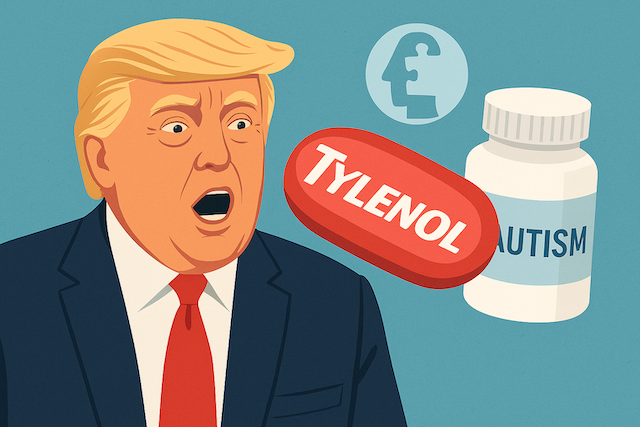Stay updated on what is trending in health. Discover tips and resources for a healthier, balanced life.
Trump, Tylenol & Autism: What He Said, What Evidence Shows
Trump linked Tylenol use in pregnancy to autism — but medical experts say evidence is weak, claims are unproven & no causal relationship exists. Stay informed.
NEWS
Dr. S. Ali
1/19/20263 min read


What the US President Trump Claimed
Recently, the President of the United States, Donald Trump made comments suggesting a link between Tylenol (acetaminophen) and autism—a claim that stirred up conversation and controversy. Since Tylenol is one of the most widely used over-the-counter pain relievers in the world, it’s important to break down what he said, what Tylenol actually is, and what the science says about autism.
What Is Tylenol?
"Tylenol" is the most well-known brand name for the drug acetaminophen. Depending on where you are in the world, it goes by different names:
Tylenol – Primarily in the United States & Canada
Panadol – Widely used in Europe, Asia, and Australia
Calpol – Common in the United Kingdom, India, and Ireland
Paracetamol – The most recognized name outside North America
Ofirmev – An IV form often used in hospitals internationally
In the U.S., you might also see it sold under other names like Panadol, Mapap, or as store-brand versions such as Equate (Walmart) or Up & Up (Target).
Here’s the important part: because acetaminophen is so common, it’s often hidden inside multi-symptom medicines like NyQuil, Theraflu, and Excedrin. That means it’s easy to accidentally double up without realizing it. Always check the “Active Ingredients” on medicine labels—taking too much acetaminophen can be dangerous for your liver.
Unlike ibuprofen (Advil), which reduces inflammation, acetaminophen works mainly in your brain to lower fever and relieve headaches or everyday aches and pains.
Why Tylenol Is Part of the Autism Debate
This background matters because Trump’s comments specifically referenced Tylenol in relation to autism. Tylenol is one of the most recognized household medications in the United States, widely used for fever and pain relief in both adults and children. Globally, the same drug—acetaminophen—is commonly known as paracetamol and is sold under brand names like Panadol and Calpol.
Because of its widespread use, any suggestion that Tylenol could be linked to autism quickly draws public attention. Parents, in particular, may worry about everyday medicines they’ve given to their children for years. This high level of concern is amplified by the fact that acetaminophen is often an ingredient in multi-symptom cold, flu, or pain relievers, meaning people may take it without realizing it.
While some observational studies have raised questions about potential links between acetaminophen use in pregnancy and autism risk, the scientific evidence remains inconclusive. No high-quality clinical trials have confirmed a causal relationship. That’s why health experts emphasize caution: public claims about Tylenol and autism can stir anxiety but don’t reflect the current consensus of medical science.
How the Medical & Scientific Community Has Responded to Trump’s claims
Experts have pushed back strongly, saying there is no reliable evidence to support a causal link between Tylenol use during pregnancy and autism. Much of the research shows either weak associations or no association, and no proof of causation.
Several major medical societies (obstetrics, pediatrics) warn that avoiding Tylenol completely could be dangerous, particularly if fever or severe pain are left untreated, which themselves carry risk during pregnancy.
What the Evidence Actually Shows
When it comes to acetaminophen (Tylenol) and autism, research findings are mixed. Some observational studies and meta-analyses suggest a possible weak association between acetaminophen use during pregnancy and an increased risk of autism under certain conditions. However, no high-quality, definitive clinical trial has proven a causal link. This means that while the topic is worth continued research, the claim that Tylenol directly causes autism is not established.
From a public health perspective, most medical authorities continue to consider controlled, limited use of acetaminophen during pregnancy safe when used under medical guidance for fever or pain. Current evidence does not support broad advisories to avoid Tylenol altogether in pregnancy, and decisions should always be made in consultation with a healthcare provider.
Why This Matters
If widely adopted without strong supporting evidence, such statements risk misinforming pregnant women, leading some to avoid necessary medications for pain or fever. This avoidance could actually pose greater health risks than the medication itself. Public health experts emphasize the importance of basing recommendations on robust scientific data, as premature claims can cause confusion and unnecessary anxiety. On the policy and regulatory side, the Trump administration has proposed label changes for Tylenol, including stronger warnings around its use during pregnancy, reflecting ongoing debate and concern at the national level.
Bottom Line: What You Should Know
While Trump has made bold claims linking Tylenol (acetaminophen) and autism, the scientific evidence so far does not confirm that Tylenol causes autism. Experts stress that the available research is inconclusive, and more high-quality studies are needed before drawing firm conclusions. If you are pregnant or caring for someone with related concerns, the safest approach is to consult trusted medical professionals, follow current medical guidelines, and carefully weigh the benefits versus risks.
Related Articles:
1. Paracetamol: What You Need to Know About Its Side Effects
2. Autism: Strengths, Challenges, Support, and Everyday Life
3. Asperger’s Syndrome and Autism: Understanding the Spectrum with Compassion
Sources:
PubMed
https://pubmed.ncbi.nlm.nih.gov/39243316/
CIDRAP (Center for Infectious Disease Research and Policy)
https://www.cidrap.umn.edu/public-health/experts-push-back-trumps-tying-autism-childhood-vaccines-tylenol
Scientific American
https://www.scientificamerican.com/article/does-tylenol-use-during-pregnancy-cause-autism-what-the-research-shows/
PolitiFact (PBS News)
https://www.pbs.org/newshour/health/research-doesnt-show-using-tylenol-during-pregnancy-causes-autism-here-are-5-things-to-know
Pulse Your Health
Empowering you to achieve your health goals.
Contact
© 2026. All rights reserved.
Disclaimer: The content on this website is for informational purposes only and is not medical advice. Always seek the advice of your physician or other suitably qualified healthcare professional for diagnosis, treatment and your health related needs.
